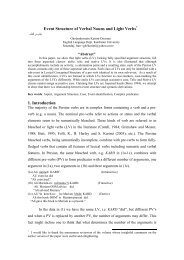Separability of Light Verb Constructions in Persian*
Separability of Light Verb Constructions in Persian*
Separability of Light Verb Constructions in Persian*
Create successful ePaper yourself
Turn your PDF publications into a flip-book with our unique Google optimized e-Paper software.
c. tegarg-e diruz ʔ<strong>in</strong> latme-ra: be ba:q-e man zad.<br />
hail-Ez. yesterday this damage-DOM to garden-Ez. I beat-past<br />
‘The yesterday’s hail caused this damage to my garden’<br />
d. latme-ʔi ke tegarg be ba:q-ha: zad jobra:n na:pazir ʔast.<br />
damage-Indef. Art. that hail to gardens beat-past irretrievable is<br />
‘The damage caused by the hail to the gardens is irretrievable.’<br />
e- Ali če latme-ʔi be šoma: zad?<br />
Ali what damage-Indef. Art. to you beat-past<br />
‘What loss did Ali cause to you?<br />
f. ʔ<strong>in</strong> latme-ra: tegarg-e diruz be ba:q-e man zad.<br />
this damage-DOM hail-Ez. yesterday to garden-Ez. I beat-past<br />
‘The yesterday’s hail caused this damage to my garden’<br />
We should note that <strong>in</strong> (3) not only is a PV modified by an adjective (3b), preceded by a<br />
determ<strong>in</strong>er, i.e. ʔ<strong>in</strong> ‘this’ (3c), and assigned direct object case (3c), but also the LVC is<br />
broken by the PPs be ba:q-e man ‘to my garden’ (3b- c) and a relative clause can appear<br />
between the PV and the LV (3d).<br />
As far as separability is concerned, the LVCs <strong>in</strong> (4a) and (5a) behave differently<br />
from the LVC <strong>in</strong> (3a). Unlike the LVC <strong>in</strong> (3b-f), a PV <strong>in</strong> the LVCs <strong>in</strong> (4b-f) and (5b-f),<br />
can never appear <strong>in</strong> a DP which can be modified by an adjective (4b, 5b) and cannot<br />
function as the direct object (4c, 5c). Moreover, it cannot be relativized (4d, 5d), focused<br />
on by Wh-<strong>in</strong>terrogatives (4e, 5e) and scrambled (4f, 5f). Follow<strong>in</strong>g Karimi-Doostan<br />
(1997), we refer to the LVCs such as those <strong>in</strong> (3) as separable LVCs and those like (4-5)<br />
as <strong>in</strong>separable LVCs.<br />
(4) a. Ali ka:r-aš-ra: ʔanja:m da:d.<br />
Ali work-his-DOM perform<strong>in</strong>g give-past<br />
‘Ali did his work.’<br />
*b. Ali ʔanja:m-e xub-i (ʔaz) (be) ka:r-aš da:d.<br />
Ali perform<strong>in</strong>g-Ez. good-Indef. Art. (<strong>of</strong>) (to) work-his give-past<br />
‘Ali had a good performance <strong>in</strong> his work. / Ali did his work well.’<br />
*c. Ali ʔ<strong>in</strong> ?anja:m-ra: (ʔaz) (be) ka:r-aš da:d.<br />
Ali this perform<strong>in</strong>g-DOM (<strong>of</strong> ) (to) work-his give-past<br />
‘Ali did his work.’<br />
*d. ʔanja:m-i ke Ali (ʔaz) (be) ka:r-aš da:d m<strong>of</strong>id bud<br />
perform<strong>in</strong>g-Indef. Art. that Ali (<strong>of</strong>) (to) work-his give-past useful was<br />
‘Ali’s perform<strong>in</strong>g his work was useful.’<br />
*e. Ali če ʔanja:m-i (ʔaz) (be) ka:r-aš da:d?<br />
Ali what performance-Indef. Art. (<strong>of</strong>) (to) work-his give-past<br />
‘What sort <strong>of</strong> performance did Ali have <strong>in</strong> his work?’<br />
3



